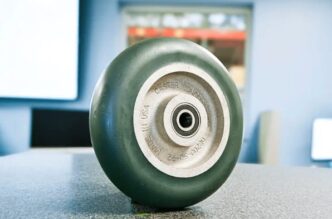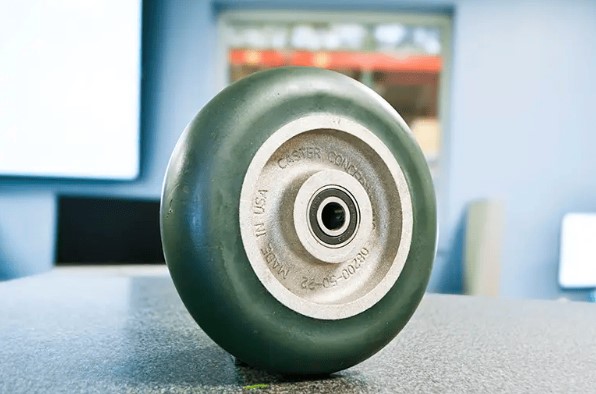Polyurethane rollers have become a preferred choice in various industries due to their durability, versatility, and superior performance. Unlike traditional rubber or metal rollers, polyurethane rollers offer unique benefits that make them ideal for applications in manufacturing, logistics, and even ground-support equipment (GSE). Whether used for conveyor systems, printing machines, or material handling, polyurethane rollers manufacturers provide significant advantages that enhance efficiency and longevity. In this article, we explore the seven key advantages of polyurethane rollers in different industries.
1. Superior Durability and Longevity
One of the standout features of polyurethane rollers is their exceptional durability. Compared to rubber rollers, polyurethane rollers resist wear and tear, making them last significantly longer. This durability reduces the frequency of replacements, lowering maintenance costs and minimizing downtime in industries such as manufacturing and packaging.
Polyurethane’s resistance to abrasion and environmental factors also ensures consistent performance in high-stress applications. Unlike rubber, which can crack or degrade over time, polyurethane maintains its structural integrity, even in demanding conditions.
2. High Load-Bearing Capacity
Industries that handle heavy loads require rollers that can withstand extreme pressure without deformation. Polyurethane rollers have a high load-bearing capacity, making them suitable for applications involving conveyor belts, industrial machinery, and warehouse automation systems. Their ability to distribute weight evenly enhances operational efficiency while preventing damage to delicate materials.
Additionally, polyurethane rollers do not compress under pressure as much as rubber alternatives, ensuring smoother movement and reducing the risk of operational inefficiencies caused by roller deformation.
3. Resistance to Chemicals and Environmental Factors
Industries such as food processing, pharmaceuticals, and automotive manufacturing often expose rollers to harsh chemicals, oils, and cleaning agents. Polyurethane rollers offer excellent resistance to a wide range of chemicals, making them ideal for such environments. Unlike rubber rollers, which can deteriorate when exposed to certain substances, polyurethane remains intact, ensuring long-term reliability.
In addition to chemical resistance, polyurethane rollers are also resistant to moisture, UV exposure, and temperature variations. This makes them suitable for outdoor applications or industries where rollers may be exposed to varying environmental conditions.
4. Noise Reduction for a Quieter Work Environment
Workplace noise is a major concern in industries with large machinery and material handling systems. Polyurethane rollers help reduce noise levels by dampening vibrations and absorbing shocks. Compared to metal or plastic rollers, polyurethane produces significantly less noise, creating a quieter and more comfortable work environment.
The noise reduction benefits of polyurethane rollers are particularly advantageous in industries such as printing, textiles, and assembly lines, where excessive noise can hinder productivity and pose safety risks for workers.
5. Customization and Versatility
One of the reasons polyurethane rollers are widely used across different industries is their versatility. They can be customized in terms of hardness, size, and composition to meet specific application requirements. Whether a softer roller is needed for better grip or a harder one for increased load capacity, polyurethane can be tailored to achieve the desired performance.
Industries such as aerospace, mining, and logistics benefit from this adaptability, as polyurethane rollers can be engineered to fit unique operational needs. Additionally, they can be coated with different materials or textures to enhance their functionality.
6. Improved Traction and Reduced Slippage
Polyurethane rollers provide excellent traction, reducing slippage and enhancing material movement efficiency. This is particularly beneficial in industries where precise material handling is required, such as printing, textiles, and automotive manufacturing. Improved traction minimizes product damage and ensures consistent processing speeds, leading to increased productivity.
Unlike metal rollers, which can be too smooth and cause slipping issues, polyurethane rollers offer a balanced grip that enhances control without excessive friction. This makes them an excellent choice for conveyor systems and automated material transport.
7. Applications in Ground-Support Equipment (GSE)
Ground-support equipment (GSE) used in aviation and logistics requires durable and reliable rollers to facilitate the smooth handling of cargo and aircraft components. Polyurethane rollers play a crucial role in GSE applications, including baggage handling systems, cargo loaders, and aircraft maintenance equipment. Their ability to withstand heavy loads, resist environmental wear, and reduce noise makes them ideal for airport operations and other transportation hubs.
By incorporating polyurethane rollers into GSE, industries can improve operational efficiency, reduce maintenance costs, and ensure the safe and effective handling of critical equipment. Their reliability in demanding conditions makes them an essential component in modern ground-support infrastructure.
Conclusion
Polyurethane rollers offer unparalleled advantages across various industries, from manufacturing and logistics to GSE applications. Their durability, high load-bearing capacity, chemical resistance, and noise reduction properties make them an ideal choice for businesses seeking efficient and long-lasting roller solutions. By investing in polyurethane rollers, industries can enhance productivity, minimize maintenance costs, and improve overall operational efficiency.
Whether used in conveyor systems, heavy-duty machinery, or specialized applications like GSE, polyurethane rollers continue to prove their value as a superior alternative to traditional roller materials. Their versatility and performance make them indispensable in modern industrial processes, ensuring smooth and efficient operations in a wide range of sectors.














